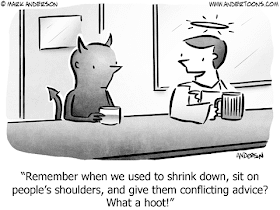Remember
that to change your opinion and to follow him who corrects your error is as
consistent with freedom as it is to persist in your error.
For
it is your own, the activity that is exerted according to your own movement and
judgment, and indeed according to your own understanding too.
—Marcus
Aurelius, Meditations, Book 8 (tr
Long)
I’ve heard all sorts of explanations
as to why I should be thinking this or doing that. I should be doing what everyone
else is doing, just because they are doing it, or I should be doing the exact
opposite of what everyone else is doing, just because they are doing it.
One answer is to follow what is
popular, while the other is to be deliberately unpopular, and what is lost in
the middle of it all is a novel idea, simply thinking or doing something
because it is right, regardless of who may or may not be promoting it.
I suspect our options are limited by
an unhealthy concern with how we are seen by others. Should we come across as
team players, or as daring individualists? But as long as the choice is the
right one, does it even matters how we are seen, or how we got there?
A decision is no more or less my
own, whether I have arrived at it alone or with others. My thoughts are still
my own thoughts, my judgments still my own judgments, and my choices still my
own choices. My approval or disapproval, my consent or opposition, always
proceeds from me, both when I do so wisely or foolishly.
I am no worse or weaker if I follow
good advice, just as I am no better or stronger if I ignore good advice. Why
must I be so stubborn and arrogant as to not allow another to help me make
myself better? Am I resisting his correction because it is wrong, or because I
don’t want to be perceived as being wrong? Once I have fixed what is broken
within me, nothing will be wrong anymore, and so that should be my priority.
Some people choose not be informed
by any conscience at all, and replace a sense of right and wrong with a measure
of gratification and calculation. Others, however, may be quite aware of their
mistakes, but find it difficult to confront them. I spent too many years
feeling that to say I was sorry, and to change my ways, would somehow make me
lose face. What I had to learn was that admitting responsibility, and finally
embracing it, was actually the strongest and bravest thing I could do.
If someone tells me that I am mistaken,
whatever his own intention may be, I do not need to get caught up in a conflict
about power and position. The only power that matters is my own power to make
my own judgment, and that should follow only from the truth of what is said, regardless of who may have said it.
Written in 2/2008

No comments:
Post a Comment